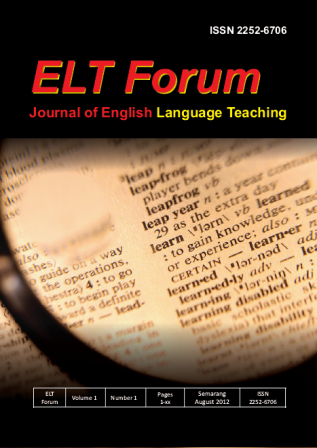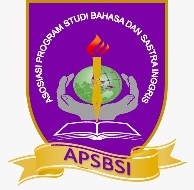A CORRELATION STUDY BETWEEN STUDENTS’ LISTENING SKILL AND STUDENTS’ PRONUNCIATION ABILITY (A Case of the Eleventh Grade Students of SMK Muhammadiyah 1 Semarang in the Academic Year of 2012/2013)
Abstract
This final project is about the correlation between the students’ listening skill and students’ pronunciation ability. The subject of the research was the eleventh grade students of SMK Muhammadiyah 1 Semarang. The basic problem the writer wanted to discuss in this final project was the importance of listening skill and pronunciation ability of the eleventh grade students of SMK Muhammadiyah 1 Semarang in order to develop their communication skill. The final project was aimed at finding out the level of listening skill of the eleventh grade students of SMK Muhammadiyah 1 Semarang in the academic year of 2012/2013, examining their pronunciation ability, and finding out whether there is a correlation between students’ listening skill and students’ pronunciation ability. The population of this final project was the eleventh grade students of SMK Muhammadiyah 1 Semarang in the academic year of 2012/2013 and it was 43 students. Twenty students were taken as the representations in this research. After conducting the research, it was found that the average score of the students’ listening skill was 80.1, that was in good level. On the contrary, their pronunciation score was poor referring to their average score, which were 48.78. Moreover, the result of data analysis using SPSS shows that the correlation coefficient between the two variables (listening skill and pronunciation ability) is 0.379, while the critical value for 18 students and 95% confidence is 0.468. Since the correlation coefficient obtained (0.379) is lower than the table value (0.468), it means that there is no significant positive correlation between the two variables and the correlation is considered to be low. Based on the research findings, it is suggested that the teachers should find an effective way to develop the students’ listening skill and their pronunciation. Furthermore, since pronunciation is not explicitly specified in the curriculum, the teachers have a duty to help their students in improving their pronunciation ability.
References
Arikunto, S. 2002. Prosedur Penelitian Suatu Pendekatan Praktek. Jakarta: PT. RinekaCipta.
Brown, H. D. 2005. Principles of Language Learning and Teaching: Fourth Edition. New York: Pearson Education, Inc.
Cohen, L. 2000. Research Methods in Education: Fifth Edition. New York: Routledge Falmer.
Lodico, M. G. 2006. Method in Educational Research: From Theory to Practice. San Fransisco: John Wiley & Sons, Inc.
Saleh, M. 2001. Pengantar Praktik Penelitian Pengajaran Bahasa. Semarang: IKIP Semarang Press.
Online articles :
Gilbert, J. B. 2008. Teaching Pronunciation. Available at: www.cambridge.org/other_files/.../Gilbert-Teaching-Pronunciation.pdf [accessed 27/01/13]
Lawson, K. 2007. The Importance of Listening. Available at: www.growinggreatness.com/gg.../The_Importance_of_Listening.pdf [accessed 27/01/13]
Liubiniene, V. 2009. Developing Listening Skills in CLIL. Available at: www.kalbos.lt/zurnalai/15_numeris/14.pdf [accessed 17/05/13]
Simon, M. and Goes, J. 2011. Correlational Research. Available at: dissertationrecipes.com/wp-content//04/Correlational ResearchX.pdf [accessed04/02/13]
Speaks, S. 2009. Reliability and MTBF Review. Available at: www.vicorpower.com/documents/quality/Real_MTBF.pdf [accessed 27/01/13]
Wolvin, A. D. 2009. Listening, Understanding, and Misunderstanding. Available at: www.sagepub.com/edwards/study/materials/reference/77593_5.1ref.pdf [accessed 28/01/13]



_.jpg)
_.jpg)




